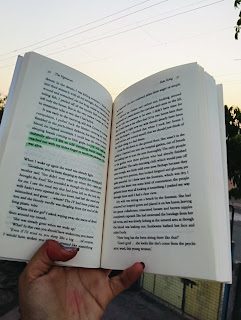The Vegetarian by Han Kang
I have never read a book like "The Vegetarian" before in a single sitting. It unsettled me, disturbed me, and yet, I couldn’t put it down. Han Kang’s novel pulled me into a world where the ordinary turns surreal, where a simple decision to stop eating meat becomes an act of rebellion, madness, and transformation. As a vegetarian, it was impossible for me to comprehend the central conflict of the novelwhy can’t someone choose to be vegetarian?
The story follows Yeong-hye, a woman who, after a series of disturbing dreams, decides to stop eating meat. It is not a loud decision; she does not declare it to the world. She simply stops. But in the rigid, patriarchal society of South Korea, this small act sets off a series of shocking events. Her husband, Mr. Cheong, sees it as an inconvenience. He cannot understand why his wife refuses to cook meat for him.
“Before my wife turned vegetarian, I’d always thought of her as completely unremarkable in every way.”
This line hit me hard. How can someone think of their own partner as unremarkable? He repeatedly portrays her in a negative light unattractive, troublesome trying to prove that she is a "madwoman in the attic." "Your body smells of meat," she says, reducing him to an object of disgust.
As I read, I felt increasingly uneasy. Mr. Cheong does not love Yeong-hye. He only loves the routine, the convenience she provides. He sees her as a duty, an extension of himself. And when she dares to make a choice for herself, he reacts with disgust and violence. The moment her father and brother force meat into her mouth at a family dinner made my stomach churn. I felt Yeong-hye’s suffocation, her helplessness, as she was held down and fed something she no longer wanted to consume.
This novel made me question so much about choice, control, and how society polices women’s bodies. Yeong-hye’s body becomes a battlefield, a space that others seek to control her husband, her family, even doctors. She stops eating. She stops speaking. She withdraws further and further into herself. She dreams of turning into a tree, of shedding her human form entirely. At first, I was confused—how could someone desire to stop being human? But the more I read, the more I understood. In a world that is cruel, where autonomy is denied, where even your own body is not yours, becoming something else, something that cannot be hurt, starts to seem like the only escape. She says,
"I become a different person, a different person rises up inside me, devours me..."
The novel is divided into three parts, each narrated from a different perspective. The first is from her husband, the second from her brother-in-law, and the third from her sister, In-hye. I longed for Yeong-hye’s own voice. She remains distant, silent, slipping away from the reader just as she slips away from the world. But maybe that’s the point. Maybe we are meant to feel that loss, that absence.
The second part of the novel was the most haunting for me. Yeong-hye’s brother-in-law becomes obsessed with her. He is a failed artist, and he sees Yeong-hye not as a person, but as something to be used for his art, for his desire. He convinces her to let him paint her body with flowers, to film her in erotic, surreal scenes. “Only the images in my mind are real. My wife, my child, my work—none of them matter.” This obsession repulsed me. Yeong-hye, already fragile, is once again being used by someone else. And yet, in her mind, she is free. She embraces the idea of becoming something beyond flesh and bone. Her body is described as "violence that could not simply be dismissed as passivity or idiocy or indifference, which she would appear to be struggling to suppress." I couldn’t decide if this was liberation or complete self-destruction. Maybe it was both.
In the final section, we see Yeong-hye in a psychiatric hospital. She has stopped eating entirely. She stands in the sunlight for hours, believing herself to be absorbing energy like a plant. In-hye, her sister, is the only one who stays by her side. This part broke me. In-hye, exhausted and alone, realizes that she, too, has been trapped her whole life trapped in duty, in sacrifice, in expectations. “Why, is it such a bad thing to die?” Yeong-hye asks her. And for a moment, In-hye cannot answer. "Had her body metamorphosed into a sturdy trunk, with white roots sprouting from her hands and clutching the black soil?"
This book made me feel helpless. It made me feel uneasy. But most of all, it made me feel deeply connected to Yeong-hye’s suffering. It is not a book about vegetarianism. It is a book about resistance, about mental illness, about the ways society crushes those who do not conform. Han Kang’s writing is sparse, cold at times, yet filled with unbearable beauty. She does not give us clear answers. She does not tell us what is right or wrong. She simply shows us the unraveling of a woman who wanted something different.
By the end of the novel, I was left with a heavy heart. Yeong-hye’s journey is not one of triumph. It is one of erasure. And yet, she lingers. Her presence, her silence, her pain—these stay with me. "What terror, what anger, what agony, what hell?"
I don’t know if I loved this book. Love is the wrong word. But I will never forget it. And maybe that’s what truly matters.
Yes, so this is my review hope that will make you inspire to read it.
Thank you.



No comments:
Post a Comment